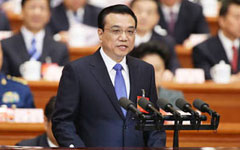Soft spots emerging in property market data
By Hu Yuanyuan (China Daily) Updated: 2014-03-19 07:38In Beijing, the rate of price increases has fallen for four consecutive months, mainly because of the city's plan to put an extra 70,000 units of subsidized housing into the market.
 |
 |
In response, developers are cutting prices for projects featuring middle-class, owner-occupied units.
China Vanke Co Ltd, for instance, has set its selling price for a project along the capital's southern Fifth Ring Road at 21,680 yuan ($3,426) per square meter, well below market expectations of 26,000 yuan per sq m.
Given the weak national economic data for the start of the year, and significant regional differences in housing market developments, Zhu said that some property curbs may be eased in cities where prices are under pressure.
The curbs include purchase restrictions and tougher mortgage conditions.
"Such easing could happen at the discretion of city-level governments, but it's unlikely to evolve into a shift in the national policy," Zhu added.
According to Zhu, first-tier cities generally have supply shortages that reflect tougher curbs, tighter supply and stronger demand.
In contrast, supplies have increased faster in smaller cities. As demand tends to be sticky in smaller cities, it takes time to digest such increases, so prices could be under pressure in the coming years.
"Overall, we expect house prices to increase 10 percent in first-tier cities, five to 10 percent in second-tier cities and remain flat in third-tier cities in 2014," said Zhu.
|
 |
 |
| The 10 most expensive cities to rent office space |
- NHTSA says finds no 'defect trend' in Tesla Model S sedans
- WTO rare earth ruling is unfair
- Amway says 2014 China sales may grow 8%
- President Xi in Europe: Forging deals, boosting business
- CNOOC releases 2013 sustainability report
- Local production by Chery Jaguar Land Rover this year
- Car lovers test their need for speed in BMW Mission 3
- China stocks close mixed Monday

















